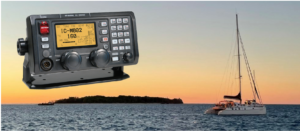

Online Marine Radio Course & Exam
VHF and MF/HF
Gain your marine radio licence and meet the legal requirements, get an MMSI and enjoy safer boating.
All-inclusive package cost just $249
Normally $324 when sold separately
No hidden costs
Course + Exam + Licence = $249 – no more to pay
(Pay us $160 and the $89 licence fee direct to OMC)
Why choose us?
- 100% online course and exam
- Complete at your own pace
- Start today
- NO EXTRA TO PAY!
- High quality online learning
- Google Reviews – Trust Index 5 Star company
- Friendly support staff available
“Tim was a great instructor – calm, very knowledgeable and patient. The SROCP exam was a piece of cake by the time we got to it because of the way the session was run, so I strongly recommend seeing Tim at Blue Water for any courses or training!” – Jono Lane
“The Blue water Sailing School VHF Radio course presented by Tim Foster is very well organised and easy to follow. Tim has a very clear concise presentation style that is much appreciated. I enjoyed the content as it applied to real world situations. I would recommend this course to anyone that enjoys time in a boat, particularly, if they are master and therefore responsible for the lives of others using a boat.” Grant Henderson / Freedom 21.
VHF (Short Range)
9 lessons of 30-40 mins each
Approx. 5 hrs total
- Parts and operation of a VHF radio
- How to call for help in an emergency
- Communicating with other vessels at sea
- Use of Digital Selective Calling (DSC)
- Other maritime distress and safety systems
- Maintenance and emergency repairs of power supply and radio equipment
MF/HF (Long Range)
10 lessons of 30-40 mins each
Approx. 6 hrs total
- Everything in the VHF course plus:
- Parts and operation of a MF/HF radio.
- MF/HF bands and frequecnies, including emergency and calling frequencies.
- MF/HF radio wave propogation and how to find the best frequency for the ionospheric conditions.
Take the first lesson for no cost to get a taste before you commit. Click ‘Enrol’ below to go to our courses site and register.
Frequently Asked Questions
Do you need a marine radio license to operate a VHF radio in Australia?
It’s just like driving a car – you can drive without a license, but its not legal, and not a great idea. Plus, doing the course and gaining the licence helps ensure you know the proper procedures in an emergency.
Do individual marine radios need to be licensed?
Marine VHF transceivers now operate under a class licence, there is no requirement for an official call sign and maritime ship station licence, but the operator must have as a minimum Short range certificate of proficiency (Marine radio operator’s VHF certificate of proficiency).
What is an MMSI and do I need one?
An MMSI – or Maritime Mobile Service Identity – is a unique 9-digit number that is programmed into your VHF and/or AIS. The number identifies you and your vessel to emergency services. It allows you to push a button on your transceiver (the DSC button) to make a distress call, conveying vital information to rescuers.
MMSIs are issue by AMSA (Australian Maritime Safety Authority). You must have a marine radio operator qualification in order to get an MMSI.
You are required to apply for an MMSI if you have the following equipment:
- fixed very high frequency (VHF) radio with digital selective calling (DSC)
- a handheld VHF DSC
- high frequency (HF) DSC
- automatic identification system (AIS)
Does the Marine License Expire?
No. The licence does not expire and does not need to be renewed.
How do you conduct practical test online?
There are five competencies that need to be demonstrated during the practical:
- Turning on a unit, changing channel, adjusting volume and squelch
- Make a DSC Distress call
- Making a MAYDAY call
- Logging on to VMR
- Set a channel for dual watch
During the practical we simulate the MAYDAY and log in, and candidates describe how they would undertake the other operations.
What is the range of a VHF transceiver?
The VHF band is line of site. It usually does not bend like lower frequencies do. Line of site varies, but is around 10-15 nautical miles.
Do we need marine radios when we have mobile phones?
In certain emergencies it may be best to use a mobile phone if it is in range. However, the advantage of a VHF unit is that it is a public broadcast, so other vessels may be able to assist more quickly than emergency services. If you are out of mobile range you may still have VHF range, especially via a repeater, and other vessels may be able to relay your message.
Should I get a GPS in my marine radio?
A GPS receiver for a VHF radio is highly recommended as it means a DSC alert will include your location.
What is the OMC?
The Office of Maritime Communications is the only body in Australia that can award marine radio qualifications. The office is part of the Australian Maritime College, Australia’s national institute for maritime training, education and research.
Does an MF/HF unit need to be licenced?
Yes, the apparatus needs to be licenced and the operator requires a Certificate of Proficiency. When the apparatus is licenced a call sign will be issued by the ACMA (Australian Communications and Media Authority). This is unlike a VHF unit which is covered by a class licence, and only the operator needs to be qualified.
How long does it take of a marine licence to be issued?
The Office of Maritime Communications has a maximum of 15 workings days upon receipt of your application and completion of the exam to finalise processing. Postage time is additional. So, allow 4 weeks.